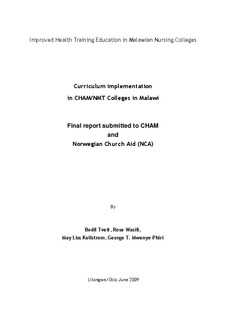| dc.description.abstract | Curriculum development has been a part of the network project “Improved Health Training Education in Malawian Nursing Colleges” since its initiation (2005). The midterm evaluation report of the project (2008) identified a need to focus more on curriculum issues which are so crucial to the quality of an educational program. To be able to continue with a more appropriate approach to this complex area, the need for a more overall assessment of the existing curriculum implementation in the NMT colleges was brought up.
This investigation was conducted by a team of 2 Malawian and 2 Norwegian tutors assessing the following 4 areas of curriculum implementation:
Planning tools and systems.
The current implementation of the curriculum (both theoretical and clinical courses).
Experienced/perceived needs, problems and challenges.
Monitoring and evaluation tools and systems.
The main methodological approach were interviews with college management, tutors, students and hospital staff in all 9 CHAM colleges offering a NMT program in nursing. Some observation on sites were included (skills lab, library, notice boards) as well as some analyses of written documents (planning tools, course outlines etc).
The need for further work to increase the management competency in elaboration of adequate planning tools and monitoring/evaluation systems is apparent. Such tools are indispensable to be able to continually assessing the program, correcting errors as they occur and continuously improving the quality of the planning.
Another important area is the need to continue the efforts to equip the colleges with sufficient teaching and learning resources such as library resources, skills labs etc.
The most important and difficult challenge is though linked to more pedagogical and didactic problems. This investigation of curriculum implementation in the CHAM/NMT colleges in Malawi has drawn a picture of an education programme built on quite traditional pillars. The implementation of the theoretical part of the courses is characterized by overcrowded courses and teachers doing their best to transmit all the content, mainly by lectures, to student trying hard to write down what the teachers teach. The implementation of the clinical part of the courses is characterized by a somehow poor organisation and quite limited didactic approaches (mainly demonstrations and assessment of procedures).
The problems of curriculum implementation are most probably corresponding with a lack of competence and a need for more knowledge within the group of tutors in the NMT colleges. However it is also very important to regard the problems as very closely linked to the NMT syllabus and the core curriculum itself. The syllabus (and the core curriculum) tends to promote a program focused on the delivery of a great number of topics and a very broad and comprehensive content. It also tends to focus more on the teacher as a transmitter of knowledge than on the student as a learner. Comparing this to current tendencies in nursing education the need to reconsider the NMT syllabus and core curriculum is quite evident.
In the new millennium, with an increasingly amount of new knowledge available through internet (although not yet available everywhere), health care environment will increasingly demand nurses to be “information literate” professionals, able to solve complex patient problems by using the best available knowledge). Even nurses with a NMT diploma level need to be able to recognize when information is needed and have the ability to locate, evaluate and effectively use new knowledge. A modernized educational program should put emphasis on development of critical thinking skills and commitment to life long learning, because such skills may prepare students to deal with the complex and ambiguous aspects of a rapidly changing health care system. The need to have a curriculum more focused on developing such skills is obvious. | en |
